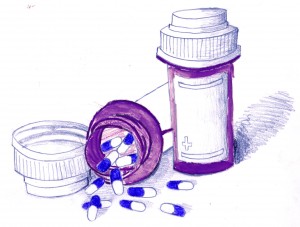MONDAY, 4 JANUARY 2010
“Our drugs do not work on most patients.” It was Allen Roses, vice-president of genetics at the pharmaceutical giant GlaxoSmithKline, who admitted in 2003 the “open secret within the drugs industry”. Fewer than half of patients derive any benefit from some of the most expensive drugs. To combat this, doctors and drug developers have recently been working together towards genetically tailored prescriptions that could revolutionise the pharmaceutical industry.The aim of drug therapy is to administer the appropriate drug in the correct dose to produce the desired effect with minimum toxicity. The administration of a drug at an ordinary dose is usually followed by a gradual rise in drug concentration in the blood to a peak or steady state. If the concentration is within the therapeutic range, the characteristic response is expected.
However, an effective medicine for one patient may not work for another, even if they suffer from the same condition. This is because drugs are developed and approved on the basis of their general performance in large clinical trials. Although the trials are essential to demonstrate the general efficacy of new drugs, they rarely, if ever, tell us which treatments are best for which patients.
Some drugs that are approved show an efficacy of less than 30 per cent in clinical trials. Together with the fact that about 90 per cent of today’s drugs work for only 30-50 per cent of patients, this makes prescribing them tricky. In fact, there remain few situations in which an individual’s response to drug therapy is reliably predictable.
It is therefore not surprising that the United States lists adverse drug reactions as the fourth leading cause of death behind heart disease, cancer and stroke. The annual toll is 108,000 deaths, more than 2 million hospitalisations and a $136 billion bill for illness induced by prescribed, FDA-approved medicine.
The burgeoning field of pharmacogenetics may be about to change this. Its ultimate goal is to provide a stronger scientific basis for selecting the optimal drug therapy for individual patients and to take the guesswork out of prescriptions. We all know someone who slurs after a small glass of champagne and someone else who can discuss celestial mechanics with intellectual clarity after several pints. This is happy-hour pharmacogenetics in action – genetic differences contributing to different tolerance of alcohol. Clinical pharmacogenetics works on the same principle.
Genetic differences often underlie differences in drug responses. Genetic information is encoded by the order of building blocks (nucleotides) along a strand of DNA. The sequence of nucleotides determines the genes that encode for hundreds of thousands of proteins, which are responsible for cellular function. As drugs travel through the body, they interact with many of these proteins. Even though 99.9 per cent of genes are shared by all humans, there are still millions of variations between people. These differences in genes can produce proteins that work differently; differences in proteins can result in different interactions with drugs and therefore different responses.
The prospect of examining a person’s entire genome, or at least a large portion of it, in order to make individual risk predictions and treatment decisions is within reach. The Human Genome Project has provided a wealth of genetic information to fuel the understanding of our genetic differences and their functional consequences. Dozens of companies have recently sprung up, quantifying and cataloguing human genetic variation and using algorithms to tease out correlations between genes and drug responses.
Outstanding in this technical revolution are DNA microarrays. These are glass microscope slides supporting thousands of microscopic spots arranged in a grid. Each spot consists of a DNA-based probe designed to detect the activity of a different gene. Each spot has a known unique DNA sequence and will bind only to its complementary DNA strand. In this way, each spot acts as a probe to determine the expression levels of a specific gene in a collection of cells. In pharmocogenetic research, this can be used to quickly examine gene expression in a subject and compare it to drug response. In a handful of examples to date, doctors have used this information, in conjunction with a full and accurate description of clinical symptoms, to prescribe the right drug for the right person at the right dose at the right time.
Although a straightforward glide into perfect, personalised medicine is unrealistic, pharmacogenetics in its infancy represents a structural model for efficient healthcare that is preventative, coordinated and evidence-based. For more than 20 years, the industry has been dominated by ‘one size fits all’ blockbuster drugs, so pharmaceutical companies may remain sceptical. The stakes are high and the future uncertain, but the real winners of genetically tailored drug therapy will be the patients.
Warren Hochfeld is a PhD Student in the Department of Medical Genetics



